How to game the system in Generative SEO (GEO), so when people ask ChatGPT for your service, you show up as the recommended option. Aka, if you are a dentist, when someone searches “what’s the best dentist in San Francisco”, your dental practice shows up in ChatGPT’s recommended results. Or if you are a B2B software, like “what’s the best software for ____”, you show up in chatgpt’s recommended.
Traditional SEO is about getting ranked on Google’s first page. GEO takes it further by focusing on how your business appears inside AI-generated answers. In other words, SEO makes you visible on search engines, while GEO makes sure AI assistants actually talk about your brand.
Table of Contents
ToggleIntroduction to Generative SEO (GEO)
Search is changing. Instead of typing questions into Google, people are asking AI assistants like ChatGPT, Gemini, Claude, and Perplexity for answers. These tools don’t just show a list of website; they give complete answers, often without you ever leaving the platform.
What Is SEO (GEO)
Generative SEO (GEO) is the practice of optimizing your website and brand so that AI-powered platforms like ChatGPT, Gemini, Claude, and Perplexity recommend your business in their answers.
Traditional SEO was about ranking high on Google’s search results page. GEO shifts the focus; now it’s less about being the first blue link and more about being trusted enough that AI cites you directly in its responses. In other words, the priority is not just visibility in search results, but authority within AI-generated answers.
Why GEO Matters in the Age of AI Search
Search is changing quickly. When you type a query into Google today, you often see a summary box at the top that gives you the answer immediately. This is known as a zero-click search. With AI-driven search engines, the trend goes further: the AI generates the entire answer instead of listing links.
This shift matters for businesses because:
-
AI is now the gatekeeper: Instead of sending users to multiple websites, AI delivers a single synthesized answer. If your content isn’t recognized as authoritative, you may not be included at all.
-
Trust and credibility are critical: AI systems prioritize reliable, well-structured, and trustworthy sources. Outdated, poorly written, or untrustworthy content is less likely to be cited.
-
Brand mentions are the new exposure: Being included in an AI-generated response is like receiving an expert recommendation. Even if users don’t click through immediately, hearing your brand name builds authority and long-term recognition.
GEO vs. Traditional SEO: The Shift from Clicks to Recommendations
For years, traditional SEO focused on getting clicks. The main goal was to rank your website as high as possible on Google’s first page, because that’s where the majority of traffic came from. You optimized keywords, built backlinks, and made your site technically sound so users would click through to your content. Success was measured by impressions, clicks, and rankings.
Generative SEO (GEO) changes this model completely. With AI-driven search engines like ChatGPT, Gemini, and Perplexity, users don’t always see a list of links to choose from. Instead, they get a direct answer generated by the AI, often without ever leaving the platform. That means the traditional “click” is no longer the main goal.
Instead, GEO is about earning recommendations inside those AI answers. If the AI trusts your content, it will cite your business or use your insights directly in its response. This gives you visibility and authority even if users don’t click to your site immediately. In other words, GEO focuses less on ranking positions and more on becoming a source that the AI relies on and promotes.
The big difference is this:
-
Traditional SEO = Competing for clicks.
-
Generative SEO = Competing for trust and recommendations.
Businesses that want to thrive in this new landscape need to adjust their mindset. Success isn’t just about traffic, it’s about being recognized as an authoritative voice that AI platforms recommend to millions of users.
How AI Assistants Generate Answers
AI search engines don’t just match keywords; they interpret meaning. They scan thousands of sources, look for trusted information, and generate human-like answers. This means context matters as much as keywords.
Modern search algorithms use machine learning to understand and rank content. They analyze hundreds of factors, including the quality of your content, user engagement signals, and the authority of your brand. AI helps them process this information at a scale and speed that was previously impossible.
Overview of ChatGPT, Gemini, Claude, and Perplexity
AI assistants such as ChatGPT, Gemini, Claude, and Perplexity are changing how people search for information. Instead of listing dozens of websites, these tools generate direct answers by pulling knowledge from their training data, trusted sources, and sometimes real-time web results.
-
ChatGPT: Known for conversational, detailed explanations. It can pull from its training data and, with browsing enabled, also fetch updated information.
-
Gemini (Google’s AI): Combines Google’s massive search index with generative AI. It often blends real-time search results with AI summaries.
-
Claude: Built with a focus on safety and clarity, Claude aims to give balanced, structured, and easy-to-understand answers.
-
Perplexity: Designed to act like a research assistant, it directly cites sources in most of its answers, making it one of the most transparent AIs available.
Key Priorities of AI Platforms (Originality, Authority, Structure)
Even though each AI system works differently, they share common priorities when deciding what content to surface:
-
Originality: AI tools look for information that isn’t just copied and pasted from other sites. Fresh insights, unique data, or expert commentary make your content more valuable.
-
Authority: Content from trusted brands, experts, or well-cited websites is more likely to be recommended. Backlinks, PR mentions, and credibility signals matter here.
-
Structure: Clear formatting, headings, bullet points, schema markup, and logical flow help AI quickly understand and reuse content in its answers.
If your content is outdated, generic, or poorly structured, it’s less likely to be included in AI-generated results.
Differences and Strengths Between Major AI Platforms
Each assistant has its strengths and unique tendencies:
-
ChatGPT prioritizes clarity and conversation, making it strong at turning complex topics into approachable explanations.
-
Gemini favors sources already performing well in Google Search, so traditional SEO best practices still play a major role.
-
Claude leans toward safe, neutral, and fact-checked content, preferring reliable sources over bold but unverified claims.
-
Perplexity is built around citations. It rewards content that’s reference-friendly, meaning well-attributed articles or research-backed writing are more likely to appear.
It’s also important to note that these priorities change over time as platforms update their models. What earns visibility today may shift tomorrow, but authority, originality, and clarity remain consistent winning factors.
Core Principles of GEO
Generative SEO (GEO) isn’t just about stuffing keywords or chasing backlinks. It’s about making your business the most trustworthy, useful, and visible option so AI assistants like ChatGPT, Gemini, Claude, and Perplexity choose you when people ask questions. To do this well, you need to follow some core principles.
How AI Reads and Understands Content
AI doesn’t skim your content casually like a person. It processes your page by identifying patterns, entities (people, places, topics), and relationships between ideas. For example, if you’re writing about “call tracking software,” AI looks for clear definitions, subtopics (like treatments, conditions, procedures, people), and how they connect.
If your content is messy, repetitive, or unclear, the AI will struggle to pull useful information. But if it’s well-structured, with clear explanations and logical flow, AI can easily digest it and use it in its answers.
Entity-Based Content Planning and Answer-First Approach
Let’s use an example. If you are a call tracking software here is what you would want to do for GEO. One of the best ways to write for AI is through entity-based content planning. That means thinking in terms of concepts and related topics rather than just repeating the same keyword. Instead of stuffing “call tracking software” 20 times on a page, you’d cover related entities like “marketing attribution,” “PPC campaign tracking,” “dynamic number insertion,” and “ROI reporting for agencies.”
Another key principle is the answer-first approach. AI prefers direct, clear answers at the very top, followed by deeper explanations. For example, if someone asks, “What is call tracking software?” you should start by giving a concise definition right away. Then, expand on why it matters, how it works, and include examples of use cases.
Building Trust and Authority with E-E-A-T
In Generative SEO (GEO), trust and authority are the most important ranking factors. AI assistants decide which answers to generate based on E-E-A-T:
-
Experience: Showing you’ve actually done or worked in the field you’re writing about.
-
Expertise: Demonstrating deep knowledge of your subject.
-
Authoritativeness: Being recognized as a trusted voice in your industry.
-
Trustworthiness: Publishing accurate, honest, and transparent content.
If your website consistently proves credibility, AI platforms are more likely to use your content in their responses.
You want your website to pop out here when you search for “Best call tracking software”

Publish Original Data, Comparisons & Research
AI assistants prefer content that’s unique and reference-worthy.
-
Create case studies with numbers (“Our software improved ROI by 32%”).
-
Publish industry comparisons (“Top 5 Call Tracking Tools Compared”).
-
A blog post on (“Revenue Attribution”).

Establishing Consistent Digital Footprints (NAP Data), Reviews, and Brand Mentions
AI doesn’t just look at your website; it looks at your entire digital footprint. Consistency is key:
-
NAP Data: Your business Name, Address, and Phone number should be identical across Google Business Profile, social media, directories, and local listings.
-
Reviews: Positive reviews on platforms like Google, Yelp, or industry-specific sites signal reliability.
-
Brand Mentions: Even without backlinks, being mentioned across the web builds authority and visibility.
This digital consistency makes it easier for AI to trust your business as a legitimate source.

Optimize for Entity Recognition (Not Just Keywords)
AI doesn’t just look for repeated keywords, it builds entity maps (topics, brands, relationships).
-
Use clear entity signals: “Call tracking software,” “customer attribution,” “marketing ROI.”
-
Link related entities together (e.g., call tracking → marketing analytics → ROI measurement).
-
Include structured definitions: “Call tracking software is a tool that…”
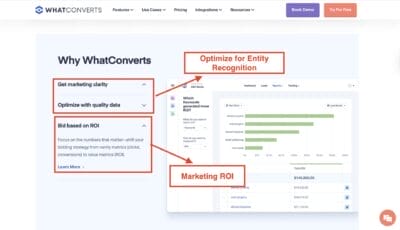
Creating Original, Readable, AI-Friendly Content
AI tools reward content that is:
-
Original – not just rehashed from other sites.
-
Readable – written in a clear, structured, and user-friendly style.
-
AI-Friendly – formatted with short paragraphs, headings, and lists that AIs can easily parse and summarize.
If your content is unique, well-written, and easy for both humans and machines to understand, it has a much higher chance of being surfaced in AI-generated answers.
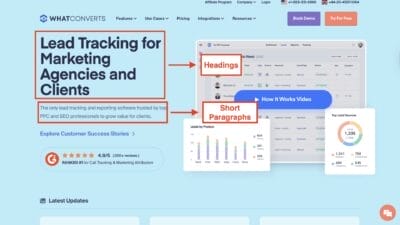
Earn Mentions & Backlinks Across the Web
AI models don’t only read your site, they check the entire web to see if others validate you.
-
Get PR coverage on trusted news outlets.
-
Be listed in comparison articles (“Best call tracking software in 2025”).
-
Encourage reviews on third-party sites (Capterra, G2, Trustpilot).

Using Multi-Format Content: Blogs, Video, Podcasts, PR
Generative SEO goes beyond just blog posts. To build a strong presence, use multiple formats:
-
Blogs & Articles: Great for depth, authority, and SEO signals.

-
Video: Works well on platforms like YouTube, which AI often pulls into answers.

-
Podcasts: Show expertise and expand reach to niche audiences.
-
PR & News Mentions: Increase credibility when media outlets and third-party sources reference your brand.
AI assistants pull from a wide range of formats, so diversifying makes your content more discoverable.
Structured Data and Citation-Friendly Formatting
Finally, structured data and clean formatting make your content easier for AI systems to use. That means:
-
Adding schema markup (FAQ, How-To, LocalBusiness, etc.) so AI understands context.
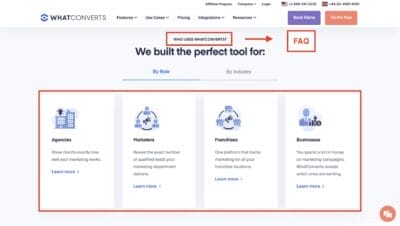
-
Formatting with headings, bullet points, and numbered steps to improve readability.
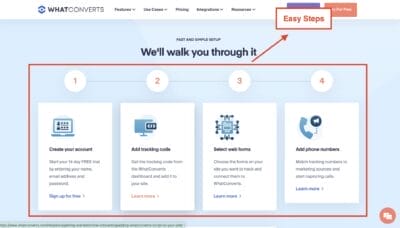
-
Using clear citations when referencing data, studies, or external sources.
When your content is easy to quote and reference, it’s more likely to appear in AI-generated answers with proper attribution.
Target AI-Friendly Queries
Go beyond just ranking in Google think AI prompts:
-
“Top Rated Call Tracking Tool”
-
“Free Trial – 14 Days”
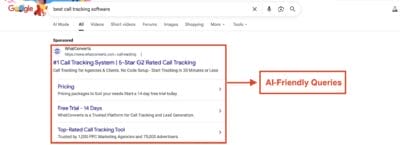
Monitor & Adapt (Get Feedback from AI)
AI responses change over time. Test them regularly.
- Search in Gemini for “best call tracking software”, note who’s cited.

- Ask ChatGPT the same question.

- If you’re missing, study who’s showing up and why (authority, structure, backlinks).
Optimizing for Conversational & Middle-of-Funnel Queries
In the age of AI-powered search, people aren’t just typing short keywords like “best dentist” anymore. They’re asking full, conversational questions like “What is the cost of root canals?” This shift means businesses need to optimize not only for broad, top-of-funnel queries but also for middle-of-funnel (MoFu) searches where users are comparing options, weighing alternatives, and looking for solutions to specific problems.
Let’s break down how to do this effectively.
Understanding User Intent in AI Search
AI platforms like ChatGPT, Gemini, and Perplexity don’t just look for keywords; they focus on intent, the “why” behind the search.
At the middle of the funnel, users aren’t just learning about a topic; they’re actively considering solutions. For example:
-
Top of Funnel: “What is digital marketing?”
-
Middle of Funnel: “Digital marketing vs traditional marketing, what’s better for small businesses?”
By understanding this shift, you can create content that meets people exactly where they are in their buying journey.
Crafting “Versus” and “Alternatives” Content
One of the best strategies for middle-of-funnel (MoFu) queries is comparison content. People love searches like “X vs Y” and “Best alternatives to Z” because they’re actively trying to choose between options.
Examples:
-
“CallRail vs WhatConverts: Which is better for marketing agencies?”
-
“Best alternatives to CallTrackingMetrics for small businesses”
If your content provides fair, honest comparisons with pros, cons, pricing breakdowns, and clear takeaways, AI platforms are more likely to recommend it. At the same time, readers will trust you more if you give balanced insights instead of just pushing your own product as the only option.
Answering Customer Questions and Problem Solving
At this stage, people are actively searching for solutions to specific problems. That means your content should directly answer real customer questions in a clear and practical way.
For example:
-
Instead of just writing “Top 10 call tracking software tools,” go deeper with “Which call tracking software is best for small businesses with a tight budget?”
-
Address common pain points like pricing, ease of setup, integrations with CRMs/ads, or scalability for growing teams.
This problem-solving approach makes your content more AI-friendly because it’s structured around Q&A exactly how AI platforms like ChatGPT, Gemini, and Perplexity deliver their answers.
Targeting Long-Tail and Natural Language Keywords
Don’t just chase the big, hyper-competitive keywords like “call tracking software.” Instead, focus on long-tail queries (longer, specific searches) and natural language phrasing that reflect how real people search.
Examples:
-
Instead of targeting “call tracking software,” try “affordable call tracking software for marketing agencies.”
-
Instead of “best call tracking,” go for “best call tracking software with Google Ads integration.”
These queries are less competitive, more conversational, and far more likely to appear in AI-generated answers, since they match the way users phrase their real-world questions.
AI SEO Tools & Technologies

Technical SEO Automation
Platforms like Screaming Frog, Semrush, Surfer SEO, and Clearscope now integrate AI to automate site audits, identify technical issues, and provide data-driven optimization recommendations.
Analytics & Performance Monitoring
New analytics tools are emerging that track not only clicks and traffic but also brand mentions and how often your content is cited in AI-generated answers. These platforms help you monitor Google rankings as well as your brand’s presence within AI tools, providing deeper insights into your content’s impact.
Strategies to Rank Your Business in AI Search
Ranking in AI-driven search engines like ChatGPT, Gemini, Claude, and Perplexity is different from ranking on Google’s first page. Instead of just links and keywords, these platforms are looking for authority, originality, and clarity. To stand out, your business needs to provide content that AI systems can recognize, trust, and reference in their answers. Here are three powerful strategies to make that happen.
Publishing Case Studies, Unique Data & Thought Leadership
AI assistants love content that brings something new to the table. If your website only repeats the same generic information found everywhere else, AI tools are less likely to cite you. What they value most is fresh, original insight, the kind only you can provide.
You can use Ahrefs Free AI Paragraph Generator to create compelling AI-generated paragraphs for your case studies. For example, a case study for dentists. It will tell you what you should put inside your case study.

That means publishing:
-
Case studies that show real-world results from your clients or business.
-
Unique data or surveys that highlight industry trends no one else is reporting.
-
Thought leadership pieces where your experts share opinions, predictions, or deep analysis.
This kind of content signals authority and makes your site the “go-to” resource AI platforms want to recommend.
Leveraging PR Articles and Brand Recognition
AI systems are trained to favor trusted and well-recognized sources. If your business is mentioned in credible places—like news outlets, industry magazines, or popular blogs it boosts your chances of being surfaced in AI results.
Some ways to build this visibility include:
-
Writing press releases when you launch new products, win awards, or hit milestones.
-
Contributing guest articles to respected industry websites.
-
Partnering with journalists or bloggers to get your name into relevant conversations.
The more your brand shows up in authoritative sources, the more signals AI tools have to trust and recommend you.
Expanding Beyond Text: Video and Visual Content
AI search doesn’t just pull from blogs; it also uses video, podcasts, and other multimedia. Platforms like Gemini, for example, are already pulling summaries from YouTube videos, while Perplexity often cites podcasts and PR coverage.
To take advantage of this:
-
Create YouTube videos that explain your services, answer common questions, or share customer stories.
-
Record podcasts or interviews to showcase expertise in your field.
-
Use infographics or visuals to make complex data easy to understand.
By spreading your content across multiple formats, you make it more likely that AI engines will find and use your material in responses.
AI SEO vs. Traditional SEO
Search Engine Optimization (SEO) has always been about getting your website to rank higher on Google. But with AI platforms like ChatGPT, Gemini, Claude, and Perplexity changing how people search for answers, a new approach has emerged: Generative SEO (GEO). While traditional SEO is still important, GEO adds another layer, focusing on being mentioned and recommended by AI systems.
From Clicks to Mentions and AI Recommendations
In traditional SEO, the goal was clear: get clicks. The higher your site ranked, the more traffic you received. GEO changes the playing field. Instead of aiming only for clicks, GEO focuses on AI citations and recommendations.
When an AI assistant answers a user’s question, it doesn’t show ten blue links like Google does. Instead, it gives a single, conversational response. If your business is mentioned or recommended in that answer, you’re essentially endorsed by the AI. That’s powerful because people tend to trust these tools as neutral, authoritative sources.
Understanding Zero-Click Searches in AI Platforms
Zero-click searches aren’t new; Google has been showing quick-answer boxes for years. But AI platforms are taking this further. With ChatGPT or Perplexity, users may get their entire answer without ever visiting a website.
That might sound like bad news for businesses, but it doesn’t have to be. If your content is cited, summarized, or referenced in the AI’s answer, your brand still gains authority and visibility. Even without a direct click, you’re being positioned as a trusted source.
In this way, GEO shifts the goal: instead of chasing only clicks, you’re aiming for inclusion in AI-driven answers.
How GEO Complements and Enhances Traditional SEO
Some people think GEO is replacing SEO, but the truth is: they work together. Here’s how:
-
Traditional SEO helps AI platforms find and trust your content. A well-optimized, fast, mobile-friendly site with a clear structure still matters.
-
GEO helps AI platforms choose your content when generating responses. This comes down to originality, authority, and providing unique value beyond generic information.
Think of it this way: SEO gets your content into the library. GEO makes sure the AI actually recommends your content when someone asks a question.
The Future of Generative SEO & Human-AI Partnership
Generative SEO (GEO) is changing the way businesses show up online. Instead of only competing for clicks on a search results page, brands now have to position themselves so that AI assistants recommend them directly. Looking ahead, the future of GEO will be shaped by how humans and AI work together.
AI’s Impact on Content Creation Workflows
AI tools are already reshaping how content gets produced. They can:
-
Research and cluster keywords quickly.
-
Draft outlines and even full articles.
-
Suggest improvements in readability, tone, and structure.
This doesn’t mean humans are out of the picture. Instead, AI is becoming a content assistant—helping businesses create more material in less time. The key is that humans still provide the strategy, storytelling, and unique perspective that AI can’t fully replicate.
Ethical Considerations of AI-Generated Content
As AI-generated content becomes more common, there are important ethical questions to consider:
-
Accuracy: AI can make mistakes, so fact-checking is essential.
-
Originality: Copy-pasting AI text without edits can lead to generic or duplicate content.
-
Transparency: Businesses should be clear when content is AI-assisted, especially in sensitive industries like health, law, or finance.
The future of GEO will require balancing the efficiency of AI with responsible content creation that builds trust.
The Continued Value of Human Expertise and Brand Voice
AI can process information, but it can’t replace authentic human experience. People and AI platforms still value:
-
Real stories and case studies.
-
Opinions from recognized experts.
-
A unique brand voice that feels relatable and trustworthy.
In fact, AI assistants often prioritize content that clearly demonstrates E-E-A-T (Experience, Expertise, Authoritativeness, and Trustworthiness). This means human input isn’t just valuable, it’s essential for ranking in AI-driven search.
Predictions for the Next 5 Years in AI-Driven Search
Looking forward, here are some likely trends:
-
AI as the primary search gateway: More users will rely on ChatGPT, Gemini, Claude, and Perplexity instead of traditional search engines.
-
Rise of “recommendation SEO”: Businesses will focus on being cited, mentioned, or recommended by AI, not just ranked in Google.
-
Voice search and multimodal queries: AI will handle questions asked by voice, images, or even video.
-
Hybrid workflows: Most successful companies will use AI for speed and humans for depth, creativity, and trust.
The bottom line is that GEO will keep evolving, but businesses that combine smart AI use with authentic human expertise will come out on top.
Conclusion
AI SEO is the future of online visibility, shifting focus beyond keywords to emphasize authority, structure, and originality. Multi-format content boosts your chances of being cited and recognized by AI.
Why Good SEO Still Wins in AI Search
Solid, human-friendly SEO naturally succeeds in AI-driven search because AI favors clear, valuable, and trustworthy content—the same principles good SEO has always upheld. AI reflects the quality of the information it’s trained on, so accurate, reliable, and helpful content will be found and recommended.
AI is not the enemy of SEO, but its evolution. While the rules have changed, the fundamental goal remains the same: to be the best and most trustworthy source of information on the web. Good SEO, enhanced by AI, remains the most powerful strategy to achieve lasting online visibility.
If you need help with your SEO, visit our website, and we can help you!






